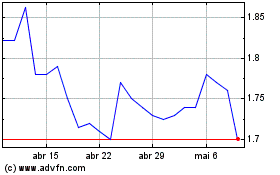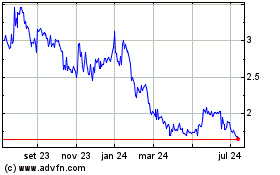By Michael Wursthorn and Peter Rudegeair
The collapse of Bill Hwang's Archegos Capital Management in late
March took many investors and several banks by surprise when
ViacomCBS Inc. and Discovery Inc.'s share prices tumbled. It turns
out that some companies were also left wondering why their share
prices whipsawed.
Executives at online lender LendingClub Corp. and digital
streaming service fuboTV Inc. still aren't sure if sudden swings in
their stock were from banks unloading billions in Archegos
investments--or if the drop was from something else entirely,
according to people familiar with the matter.
Archegos had previously told executives at LendingClub that it
was a big shareholder, said one of the people. But without the
regular disclosures that investment firms typically make after they
build up a sizable stake in a stock, those executives didn't have a
way to verify the ownership claim.
It might seem surprising that a company can't pinpoint why its
stock suddenly falls, but the Archegos meltdown shows how difficult
it can be for executives to determine who owns their company's
stock and for what reason.
A chorus of companies and advocacy groups are now calling on
regulators to revise financial-disclosure guidelines, particularly
around loosely regulated family offices such as Archegos and around
the use of derivatives, investor bets linked to stock prices
instead of the stocks themselves.
"The U.S. has gone from a leader in timely disclosure to a
laggard internationally," said Leo Strine Jr., a former chief
justice of the Delaware Supreme Court who is now a corporate
attorney at Wachtell, Lipton, Rosen & Katz.
"Even more embarrassingly, the U.S. fails to cover derivatives
and other relevant instruments that affect target companies," he
said. "We have a 1975-era regulatory regime governing a 21st
century economy, and it's high time it was fixed."
Family offices such as Mr. Hwang's are lightly regulated. A law
passed in the wake of the financial crisis intended to shore-up
financial markets, known as the Dodd-Frank Act, included an
exemption for family offices from certain reporting requirements
that pertain to most other investment firms managing more than $100
million.
Archegos was still subject to filing other stock-ownership
disclosures required by securities laws, but the firm appeared to
avoid those through its use of a type of derivative known as total
return swaps--investments made by banks on behalf of clients for a
fee. The swaps hid Mr. Hwang's holdings from the companies he
invested in, obscuring how much each was exposed to a single
investor. Archegos declined to comment.
Archegos is just one of more than 10,000 family offices that
collectively manage nearly $6 trillion in assets, said advocacy
group Americans for Financial Reform in a letter calling on the
Securities and Exchange Commission to take action to tighten
disclosure rules around such firms.
"There is no reason why large investors whose decisions can
significantly impact other investors and companies should be able
to avoid the same scrutiny other investors face simply because of
how they choose to structure their trade or their investment firm,"
the group said in the letter.
To be sure, individual stocks move because of broader factors in
the market and separate industries that wouldn't be clear even with
more aggressive disclosure requirements.
Public disclosures showed the various banks that Mr. Hwang had
worked with--including Credit Suisse Group AG, Nomura Holdings
Inc., Morgan Stanley and Goldman Sachs Group Inc.--as being the
major shareholders in stocks rather than Archegos. When a bank is
listed as a shareholder, companies have no way of knowing if the
investment is on behalf of a single investor, multiple investors or
the bank itself.
Archegos had built up a large stake in ViacomCBS, so when the
stock fell, Archegos and its banks sold off Archegos's holdings to
back up the trades. The banks unloaded more than $30 billion in
positions that Archegos had built up in ViacomCBS, Discovery and a
handful of other companies, sparking huge declines and setting in
motion the family office's meltdown.
Around the same time, shares of online lender LendingClub
slumped 11% on March 26, its biggest single-day pullback since May
of last year, and digital streaming service fuboTV's stock dropped
15% that same day.
If Archegos owned LendingClub or fuboTV stocks, the firm might
have driven down the share price by selling off its holdings.
Company executives were stumped by the sudden pullback of their
share prices until news broke of the Archegos meltdown, according
to people familiar with the matter.
Employees at fuboTV passed around a tweet from a pseudonymous
Twitter account after its shares fell on March 26, according to a
person familiar with the matter.
The tweet purported to show Archegos positions held at Nomura,
including 4.7 million shares of fuboTV. The employees
cross-referenced fuboTV's largest shareholders on FactSet and saw
that its largest one was Nomura, with 4.7 million shares as of the
end of 2020.
One other firm on the list, Viper Energy Partners LP, a spinoff
from West Texas oil producer Diamondback Energy Inc., said the
buildup of stakes by banks' prime brokerage arms was unusual and
now after the incident suggests that Archegos may have been
involved.
Nomura's prime-brokerage arm is one of Viper Energy's largest
shareholders, owning a nearly 5% stake. That large of a stake by a
prime broker is rare, said Kaes Van't Hof, president of Viper
Energy. The firm hasn't tried to confirm whether Archegos was
involved, Mr. Van't Hof said, adding that it is "hard to impossible
to find out from the prime brokers who actually owns the stock"
even if they had reached out. Nomura declined to comment.
Shares of Viper Energy had mostly fallen around the time
Archegos's bets collapsed, with shares dropping nearly 10% over a
three-week stretch ended April 9.
"It's a bit one-sided how much public companies have to disclose
versus investment funds," Mr. Van't Hof added.
LendingClub and fuboTV shares have mostly fallen since late
March, with the latter's declines drawing it down 34% for the year.
Shares of Viper Energy, meanwhile, have rebounded somewhat, rising
about 15% so far this month.
One other stock Mr. Hwang might have been involved with is
Chinese educational app maker iHuman Inc.
Shares of the company had mostly struggled since it went public
in October. But on March 29, amid Archegos's fall, iHuman's stock
experienced its second-biggest decline ever, sliding 13%.
Like Mr. Hwang's other bets that are now publicly known, banks
such as Credit Suisse and Nomura populate iHuman's top holdings,
according to FactSet. The only other clue that the family office
might have been involved is that an Archegos junior analyst had
contacted iHuman for a meeting, a person with knowledge of the
matter said.
A spokesman for iHuman said the company supported the call for
regulators to revise disclosure guidelines for investment
firms.
"I think we are in agreement with many companies in the market
that there should be greater transparency around the disclosure of
fund holdings," the spokesman said in an email. "We hope the SEC
will take a look at this and help increase transparency in the
market."
Write to Michael Wursthorn at Michael.Wursthorn@wsj.com and
Peter Rudegeair at Peter.Rudegeair@wsj.com
(END) Dow Jones Newswires
April 21, 2021 05:44 ET (09:44 GMT)
Copyright (c) 2021 Dow Jones & Company, Inc.
iHuman (NYSE:IH)
Gráfico Histórico do Ativo
De Mar 2024 até Abr 2024

iHuman (NYSE:IH)
Gráfico Histórico do Ativo
De Abr 2023 até Abr 2024
